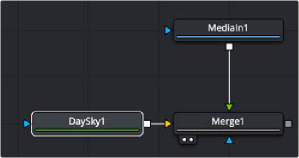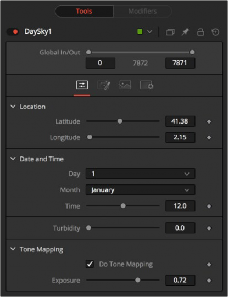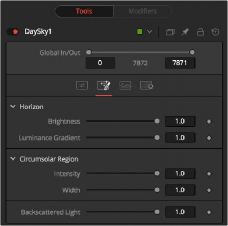
< Previous | Contents | Next >
The Image and Settings tabs in the Inspector are duplicated in many Generator nodes. These common controls are described in detail at the end of this chapter in “The Common Controls” section.
Day Sky [DS]

The Day Sky node
Day Sky Node Introduction

NOTE: This generator is a practical implementation of the research paper, A Practical Analytical Model for Daylight, by Preetham, Shirley, and Smits. A copy of the original paper can be found at the website for the Visual Simulation Group at the University of Utah [https://www.cs.utah.edu/~shirley/papers/sunsky/sunsky.pdf].
NOTE: This generator is a practical implementation of the research paper, A Practical Analytical Model for Daylight, by Preetham, Shirley, and Smits. A copy of the original paper can be found at the website for the Visual Simulation Group at the University of Utah [https://www.cs.utah.edu/~shirley/papers/sunsky/sunsky.pdf].
NOTE: This generator is a practical implementation of the research paper, A Practical Analytical Model for Daylight, by Preetham, Shirley, and Smits. A copy of the original paper can be found at the website for the Visual Simulation Group at the University of Utah [https://www.cs.utah.edu/~shirley/papers/sunsky/sunsky.pdf].
The Day Sky node aims to produce a simulation of the daylight produced at a specific time and location on the earth, and generates a high dynamic range image that represents a map of that light. It is not a sky generator, although it could be combined with a cloud generator or Noise node to produce one.
![]()
Inputs
There is a single input on the Day Sky node for an effect mask to limit the area where the day sky simulation occurs is applied.
— Effect Mask: The optional blue effect mask input accepts a mask shape created by polylines, basic primitive shapes, paint strokes, or bitmaps from other tools. Connecting a mask to this input limits the Day Sky to only those pixels within the mask.
Basic Node Setup
The Day Sky node is a generator, so it typically starts the branch of a node tree and connects to some other node, like a Merge node.

A Day Sky connected as the background to a Merge node
Inspector

![]()
Day Sky node controls
Controls Tab
The Controls tab is used to set the location and time of the daylight simulation. This will determine the overall look that is generated.
The Latitude and Longitude sliders are used to specify the location used to create the Day Sky simulation.
The Day, Month, and Time controls are used to select the specific time for the Day Sky simulation.
Turbidity causes light to be scattered and absorbed instead of transmitted in straight lines through the simulation. Increasing the turbidity will give the sky simulation a murky feeling, as if smoke or atmospheric haze were present.
Since the simulation is calculated in 32-bit floating-point color space, it generates color values well above 1.0 and well below 0.0. Tone mapping is a process that takes the full dynamic range of the resulting simulation and compresses the data into the desired exposure range while attempting to preserve as much detail from the highlights and shadows as possible. Deselect this checkbox to disable any tone mapping applied to the simulation.
Generally, this option should be deselected only if the resulting image will later be color corrected as part of a floating-point color pipeline.
Use this control to select the exposure used for tone mapping.

Day sky node controls
Advanced Tab
![]()
The Advanced tad provides more specific controls over the brightness and width of the different ranges in the generated sky.
Use this control to adjust the brightness of the horizon relative to the sky.
Use this control to adjust the width of the gradient separating the horizon from the sky.
Use this control to adjust the intensity or brightness of the sky nearest to the sun.
Use this control to adjust the width or size of the area in the sky affected by the sun.
Use this control to increase or decrease the backscatter light in the simulation.
Common Controls
The Image and Settings tabs in the Inspector are duplicated in many Generator nodes. These common controls are described in detail at the end of this chapter in “The Common Controls” section.